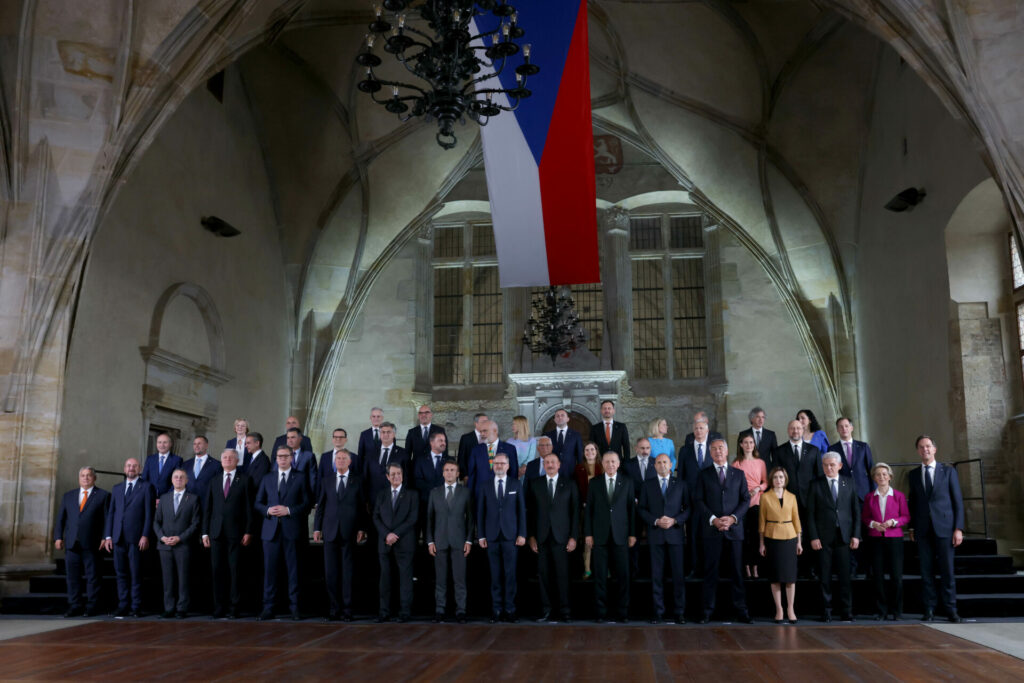The first-ever European Political Community (EPC) summit concluded on Thursday, with leaders giving positive signals about Europe's new political forum. Nonetheless, the summit sparked controversy after long-standing tensions between Greece and Turkey resurfaced.
The EPC is comprised of all 44 European states, minus Russia and Belarus, and was the brainchild of French President Emmanuel Macron. The idea behind it was to extend European political collaboration beyond the EU27 to include countries such as Ukraine, Turkey, Norway, Armenia and former EU member, the UK.
Two issues dominated discussions: the war in Ukraine and the energy crisis.
Speaking in a press conference, leaders praised Europe's unity in the face of Russia's invasion of Ukraine. They also have agreed to send an EU mission to the Armenian-Azerbaijani border to diffuse tensions, while also increasing the EU's presence in the area. After years of Brexit fallout, the UK also took a more conciliatory approach with its European allies.
Greece-Turkey tensions
The summit was coloured by controversy after tensions between Greece and Turkey were reignited on Thursday evening in Prague following a direct confrontation between the two leaders.
Turkish President Recep Tayyip Erdogan claims that his Greek counterpart Kyriakos Mitsotakis left the official dinner at the summit during his speech.
"I made a speech, the gentleman appeared very uncomfortable. Because of this discomfort and despite etiquette, I don't know who gave him permission (presumably the president) but he went out and expressed himself outside," Erdogan said. "He said that we used somewhat brutal expressions. But there is nothing serious."
"We have no views on anyone's territory. We don't want tensions with our neighbours", but "for the moment we have nothing to discuss with Greece", he insisted. "Greece's policy is based on lies. There is nothing honest about it."
In response, Mitsotakis insisted that “Greece never provokes... It does not make sense to accuse Greece of raising tensions in the Aegean when Turkey even raises issues of the sovereignty of the islands."
However, the leader clarified that “Greece is not closing the door to dialogue,” adding that “we are sure that we have international law on our side.” Tension continues to rise between the two NATO members, notably with Turkey protesting a recent Greek military deployment on two Greek islands very close to its coast.
EU to send mission to Azerbaijan-Armenia border
One more positive outcome of the summit was the plan for an EU civilian mission to visit the Armenia-Azerbaijan border in an effort to “build trust” between the two countries and help establish a clearer demarcation of borders.
In 2020, the unresolved conflict in Nagorno Karabakh was reignited between the two countries. With support from Turkey, Azerbaijan went on the offensive along the line of contact to regain territory in southern Nagorno-Karabakh.
Related News
- Ukraine to Norway: First meeting of European Political Community
- EU finance ministers plead for unity after Germany's €200 billion gas 'bazooka'
The confrontation ended Azerbaijani victory after a ceasefire agreement signed with Armenia, who ceded land in Nagorno-Karabakh. But border skirmishes broke out again just three weeks ago.
Next summit will be in Moldova
After the first edition in Prague, it was announced that Moldova will host the second meeting of the European Political Community (EPC) next spring. Moldova is one of the poorest countries in Europe.
Like neighbouring Ukraine, it was granted EU candidate status in June. The fact that the capital Chisinau can now host a CPE summit is a new “show of support that we very much appreciate”, Moldovan President Maia Sandu said.
President of the European Council, Charles Michel, suggested during the closing dinner that the next meeting should be held in Moldova, a proposal which was greeted with applause. Spain and the UK will follow.

